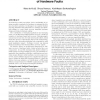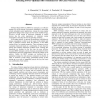412 search results - page 35 / 83 » Architectural Considerations for Energy Efficiency |
ISCA
2010
IEEE
14 years 1 months ago
2010
IEEE
As technology scales ever further, device unreliability is creating excessive complexity for hardware to maintain the illusion of perfect operation. In this paper, we consider whe...
DAC
2006
ACM
14 years 9 months ago
2006
ACM
Most existing dynamic voltage scaling (DVS) schemes for multiple tasks assume an energy cost function (energy consumption versus execution time) that is independent of the task ch...
GLVLSI
2010
IEEE
13 years 10 months ago
2010
IEEE
Loop caches provide an effective method for decreasing memory hierarchy energy consumption by storing frequently executed code in a more energy efficient structure than the level ...
ETS
2007
IEEE
13 years 10 months ago
2007
IEEE
Software-Based Self-Test (SBST) has emerged as an effective strategy for on-line testing of processors integrated in non-safety critical embedded system applications. Among the mo...
GLVLSI
2009
IEEE
14 years 10 days ago
2009
IEEE
Modern embedded devices (e.g., PDAs, mobile phones) are now incorporating Java as a very popular implementation language in their designs. These new embedded systems include multi...


